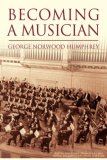 Becoming A Musician by George Norwood Humphrey
Becoming A Musician by George Norwood Humphreyrating: 3 of 5 stars
I find it hard to criticize posthumously published memoirs for two reasons: 1) the original author has no say over the final manuscript and 2) those who endeavor to publish it might risk misrepresenting the original author's intent (intentionally or not).
If one reads this memoir (as with any memoir) with a grain of salt, you can appreciate Humphrey's anecdotes about some of the most famous figures in orchestral conducting. Having graduated from New England Conservatory in 1929, Humphrey, after much perseverance, obtained a viola position with the Boston Symphony Orchestra in 1934 under the baton of Serge Koussevitsky. The book is largely a memoir of his long career with the BSO, which ended in 1977.
Humphrey cannot truly decide, however, how he feels about Koussevitsky, and this is partially what makes the book frustrating, but also one of the more interesting aspects. The reader can tell that he's grappling with his own psychology. Late in the book he acknowledges his own ambivalence, in contrasting Erich Leinsdorf to Koussevitsky:
The very thing I had always wished for now became anathema to me, for with this x-ray treatment [by Leinsdorf], all inspirational possibilities had gone. We found ourselves playing woodenly. (149)
Koussevitsky is not the only victim of Humphrey's ambivalence. He seems to have a love-hate relationship with conductors in general:
[Under Munch] we had to be prepared to do anything that he might demand for this concert, but not wish for the next. This sort of thing can make one almost as nervous as the other well-prepared version under an autocrat. (105)
While I agree, it seems to me that this discredits his implied assertion that a conductor is simply there to keep the beat. I think it would make one especially nervous if one felt that the conductor was no more than a mere metronome. As an ensemble musician myself, while I don't prefer bizarre maneuvers out of left field during a concert, I do appreciate if the work is "new" EVERY time it is played. I believe there is a way to do this without putting orchestral cohesion at risk.
To Humphrey's credit, while his portrayal of Koussevitsky vascillates between "grumpy old man" and the Devil incarnate, he doesn't unreasonably idolize Munch, or any of the other successors. He acknowledges that the affability of Munch, for example, came at the expense of a certain lack of discipline. Moments like this smooth out his bipolar portrayal of Koussevitsky.
Humphrey includes plenty of humor (sometimes unintentionally, as he betrays his own snobberies and assumptions) and clearly communicates what was undoubtedly a love affair with music. Making no assumptions about his married life, I will say that I found the rare mention of his wife Mildred (or children) to be rather unfortunate. While I realize that the focus of the book is his musical career, one does wonder about the reaction of his spouse to his various relocations, touring, and general financial unsteadiness.
While an enjoyable and quick read, this book suffers from terrible editing. The repetitiveness is very bothersome, in that it is so obvious. Entire paragraphs reappear in later chapters, almost word for word. Direct quotes show up twice, losing any kind of impact the second time around (see, for example, Koussevitsky's "Now I feel like a guest conductor" on p. 91 AND p. 106).
Poor editing aside, Humphrey's tale of struggling musician turned successful professional violist is inspiring. In reading the book, one does have the vivid impression of the man sitting down to sincerely recount the major musical highlights of his life. His dedication and hard work would be both informative and motivational for an aspiring musician. He provides an interesting snapshot as well of the role of the orchestra as representational force in American politics.
No comments:
Post a Comment